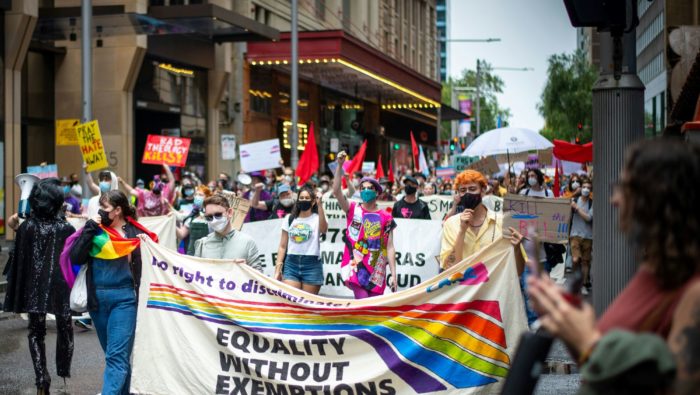
Queer Legal Praxis

Pride 2024 Special Post
When Troye Sivan came to shoot the video for his hit 2023 single Rush – a single celebrating contemporary queer sex – he sniffed on a bottle of poppers to give him a brief rush and flush, and described how it caused a vein in his head to become notably visible, which was his favourite element of the video. Poppers – small glass bottles within the alkyl nitrate family sniffed to provide a brief euphoria and to aid the relaxation of muscles – have long been a key part of queer sex and identity with long-established names such as Rush, Jungle Juice, and Liquid Gold. Yet in 2016, the UK Government seemed to ban them accidentally on purpose. Or didn’t. It remains bafflingly unclear. What might this tell us about law’s relationship with queer sex and how might queer theory help us to make sense of this?
In their 2015 edited volume Queer Praxis: Questions for LGBTQ Worldmaking, Dustin Bradley Goltz and Jason Zingsheim – researchers in performance studies and communication respectively – brought together scholars to consider how queerness is done/performed. In bringing together this scholarship with that of law, queer legal studies and Socio-Legal Studies more broadly, we can I suggest, gain broader understandings of performance, ritual, and law’s involvement in this operation. Building on this work, in a recent chapter in Joseph J. Fischel and Brenda Cossman’s collection: Enticements: Queer Legal Studies, I advance the idea of queer legal praxis in the context of the UK Government’s poppers ‘ban’ introduced as part of the Psychoactive Substances Act 2016. Queer legal praxis is, I suggest, in one sense momentary, ‘an ephemeral revelation of how law interacts with queers’, but I also argue it can be ‘a practice to evaluate and understand law.’ Whilst Goltz and Zingsheim’s collection highlighted the ways in which ceremonies and performances can be viewed as offering moments of praxis, for example the performance of a gay identity within the academy or the ways that gay weddings are constructed, queer legal praxis is, I suggest, essentially a moment when we see law’s power and how queer sex is “done” in law.
The Psychoactive Substances Act 2016 was principally designed to respond to and ban a growing category of new substances that had emerged which often mimicked the effects of traditional controlled drugs. These became known as ‘legal highs’. The legislation repealed and replaced the Intoxicating Substances (Supply) Act 1985 and sits alongside the Misuse of Drugs Act 1971 in controlling recreational drug use in the UK.
The scope of the legislation was potentially wide. For example, Schedule 1 of the Act lists exempted psychoactive substances that fall within the scope of the legislation, but which the Government did not want to ban, such as alcohol, nicotine, and coffee. The legislation is an interesting example of where law and society draw boundaries around the ‘good’ and the ‘bad’, even when the substance has the same effect within legislation.
The inclusion of poppers was discussed in the course of the legislation proceeding through Parliament. It was unclear if they fell within the scope of the legislation (i.e., whether they produce a direct or indirect high), and, ultimately, the Government passed the legislation on the basis that they weren’t sure if it banned poppers, but if it did, the law was unlikely to be enforced in relation to poppers. It was an unsatisfactory position, not least because poppers are commonly used by gay men as a muscle relaxant during sexual encounters. This was highlighted by the then Conservative MP Crispin Blunt who, in revealing his own use of poppers, prompted the front-page headline in The Sun: ‘Posh MP partial to partying pickled on poppers’ and the newspaper dubbing poppers a ‘sex drug’.
Once the legislation had been passed, Priti Patel, the then Home Secretary, wrote to the Advisory Council on the Misuse of Drugs asking them whether the Government had actually criminalised poppers and to comment on the effect of poppers. The Government could have avoided confusion and simply included them in the exemption list as Blunt had suggested, but the Government declined, preferring to initiate a review that would report after the legislation had come into force. Here was legislation that seemed to potentially criminalise an important lifestyle choice for many gay men.
The legislation had an immediate, practical effect. On the day the ban came into force, Crawley Police tweeted a photo of seized poppers in evidence bags following a ‘raid’. 57 minutes later, following a Twitter (‘X’) backlash, the Police force tweeted they had made a mistake. Yet, at this point, the Home Secretary didn’t know what the position was – and it remains to be clarified. When it comes to how queer sex is “done” in law, the ease with which elements key to it can so easily be potentially criminalised arguably provides us with a moment of queer legal praxis and a moment that invites resistance.

